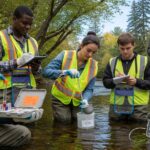Texas offers comprehensive environmental science programs from bachelor's to doctoral levels at top institutions including the University of Texas at Austin, University of Houston, and Texas A&M. Environmental scientists in Texas earn competitive salaries averaging $82,390 annually, with geoscientists earning significantly more at $144,850. The state's unique environmental challenges-from Gulf Coast ecosystems to oil and gas regulation-create strong demand for environmental professionals across government, nonprofit, and private sectors.
Even environmental efforts are bigger in Texas. The state has achieved remarkable progress in recent decades, including a 29 percent reduction in ozone levels between 2000 and 2014 and a 63 percent decrease in nitrogen oxides from industrial sources between 2000 and 2013, as well as the creation, protection, and restoration of more than 7,500 acres of coastal habitat in Galveston Bay.
From its hurricane-vulnerable position on the Gulf Coast to environmental challenges posed by a flourishing gas and oil industry to rising sea levels driven by climate change, Texas faces complex environmental issues. One such challenge includes the lasting effects of 2017's Category 4 Hurricane Harvey. As a result of this storm's surge, floodwaters containing chemicals, sewage, and other contaminants entered the state's drinking water, posing potential long-term risks to public health. Extensive remediation efforts followed.
Studying and finding solutions to these significant environmental issues is the mission of Texas's environmental scientists, whose work is valued across the private, nonprofit, and government sectors. Get a solid education under your belt, and you'll be ready to work as part of a team of trusted professionals dedicated to the protection and reclamation of Texas's natural resources.
What Can I Do with an Environmental Science Degree in Texas
As the state's leader in environmental management, the Texas Commission on Environmental Quality (TCEQ) is the governmental agency charged with improving and preserving air and water quality through monitoring, restoration efforts, and permitting. Environmental scientists are an important part of this agency, which maintains and analyzes data related to industrial emissions, chemical storage, pollution prevention, waste, wastewater management, and public water systems. The work here directly impacts millions of Texans and shapes state environmental policy.
Texas is home to a variety of nonprofit organizations that advocate sustainability through programs and initiatives. Texas Campaign for the Environment in Austin is one of the state's largest advocacy groups that spreads the word about environmental protection through grassroots efforts. The Citizens' Environmental Council in Houston is another notable group that enhances the environmental efforts of citizens, community leaders, and more than 100 environmental groups. These organizations offer opportunities to work on environmental policy and community-level planning.
Private consulting is a large employer of environmental scientists in Texas. These companies help businesses, industry, and government ensure environmental compliance to avoid the risk of fines, legal action, and sanctions. The state's strong oil and gas sector, combined with growing renewable energy development, creates consistent demand for environmental consultants. Major firms in Texas include SWCA Environmental Consulting in Houston, Baer Engineering & Environmental Consulting in Austin, and Crouch Environmental Services in Houston.
Salary and Career Outlook for Environmental Scientists in Texas
Salary potential depends on your education, experience, and often the industry in which you work. Environmental scientists in Texas earn competitive wages, with significant variation based on specialization and location.
| Occupation | Annual Mean Salary (Texas) | National Mean Salary |
|---|---|---|
| Environmental Scientists and Specialists | $82,390 | $80,340 |
| Hydrologists | $89,840 | $88,770 |
| Geoscientists | $144,850 | $100,650 |
The field is projected to grow by 6 percent through 2032, creating approximately 800 new positions annually nationwide. Texas's diverse environmental challenges-from coastal management to energy sector oversight to water resource protection-contribute to strong regional demand. Geoscientists working in the state's oil and gas industry command particularly high salaries, while those focused on sustainability initiatives find opportunities across sectors.
Master's in Environmental Science in Texas
Master's degrees are a typical pursuit of environmental scientists in Texas and are valued by employers. A master's degree in environmental science is your opportunity to refine your skills, specialize in areas that align with your career goals, and engage in advanced research that addresses real-world environmental challenges.
Graduate programs at Texas public institutions offer exceptional research opportunities and faculty expertise. The University of Texas at San Antonio's MS in Environmental Science provides interdisciplinary training with options to focus on environmental chemistry, toxicology, or ecosystem science. Tarleton State University's MS in Environmental Science emphasizes applied research with strong connections to Texas agricultural and natural resource management. The University of North Texas' MS in Environmental Science brings together faculty from Biology, Chemistry, Civil and Environmental Engineering, and Geological Sciences for truly multidisciplinary study. West Texas A&M's MS in Environmental Sciences offers unique opportunities to study the distinctive ecosystems of the Texas Panhandle.
You can expect outstanding research and field experience opportunities at these major universities, faculty members with diverse research interests and practical experience, and superb academic support services. Many programs offer thesis options that lead to publishable research and prepare students for doctoral work or advanced professional positions.
Bachelor's in Environmental Science in Texas
Undergraduate study in environmental science provides the ideal foundation for entry-level work in this field and serves as an excellent predecessor to future graduate study. Texas universities offer bachelor's programs that balance rigorous classroom study with hands-on field research.
The University of Houston's BS in Environmental Science is housed in the university's esteemed Department of Earth and Atmospheric Sciences, which offers research programs in sedimentology, structural geology, geodynamics, and marine geology. Students gain practical experience through field camps, including summer programs at the Yellow-Bighorn Research Association field station in Montana. This combination of Gulf Coast research opportunities and access to diverse field sites creates a well-rounded, hands-on course of study.
Other excellent bachelor's programs offered through state universities include the University of Texas at Austin's BS in Environmental Science, recognized for its integration of natural and social sciences, the University of Texas at San Antonio's BS in Environmental Science, which emphasizes urban environmental challenges, and the BS in Environmental Science at Tarleton State University, known for its focus on Texas rangeland and agricultural ecosystems.
Online Environmental Science Degree Options from Schools in Texas
Online degree programs provide today's learners with a convenient and flexible alternative to on-campus study. While bachelor's degrees in environmental science typically require in-person attendance for laboratory work and field experiences, graduate programs are increasingly available in fully online formats that maintain the same academic rigor as traditional programs.
In Texas, you can earn your graduate degree entirely online through the University of Houston-Clear Lake's online MS in Environmental Science. This program offers the same outstanding course of study you'd expect from the university's on-campus programs, including distinguished, internationally recognized faculty and specialized areas such as toxicology, hydrology, hazardous waste management, and wetland ecology. The online format allows working professionals to advance their education while maintaining their careers.
Texas Tech University's Master of Plant & Soil Science is another top program in Texas offered entirely online. This graduate course of study allows you to specialize in crop science, soil science, crop protection, or fibers and biopolymers. The program's flexibility makes it particularly attractive for professionals already working in agriculture, land management, or related fields who want to expand their expertise without relocating.
| Degree Level | Typical Duration | Best For | Career Outcomes |
|---|---|---|---|
| Bachelor's Degree | 4 years full-time | Recent high school graduates; career changers seeking foundation | Entry-level positions in environmental monitoring, field research, laboratory work |
| Master's Degree | 2 years full-time | Bachelor's holders seeking specialization or advancement | Senior scientist roles, project management, policy development, specialized consulting |
| Online Master's | 2-3 years part-time | Working professionals seeking advancement without career interruption | Career advancement, specialized expertise, leadership positions |
Frequently Asked Questions
What environmental science degree programs are available in Texas?
Texas offers comprehensive environmental science programs at all levels. You can earn a Bachelor of Science in Environmental Science at universities including UT Austin, University of Houston, UT San Antonio, and Tarleton State University. Master's programs are available at these same institutions, plus the University of North Texas and West Texas A&M. Several schools also offer online master's degrees, including the University of Houston-Clear Lake and Texas Tech University's Master of Plant & Soil Science. Programs range from broad environmental science degrees to specialized areas such as toxicology, hydrology, wetland ecology, and soil science.
How much do environmental scientists earn in Texas?
Environmental scientists and specialists in Texas earn an annual mean salary of $82,390, which is above the national average of $80,340. However, salaries vary significantly by specialization and industry. Hydrologists in Texas earn approximately $89,840 annually, while geoscientists-particularly those working in the oil and gas sector-earn considerably more at $144,850. Your actual salary will depend on your education level, years of experience, specialization, and whether you work in government, nonprofit, or private industry. Entry-level positions with a bachelor's degree typically start in the $50,000-$60,000 range, while experienced professionals with master's degrees can earn well into six figures.
Can I earn an environmental science degree online in Texas?
Yes, several Texas institutions offer fully online master's programs in environmental science and related fields. The University of Houston-Clear Lake provides an online MS in Environmental Science with specializations in toxicology, hydrology, hazardous waste, and wetland ecology. Texas Tech University offers an online Master of Plant & Soil Science with specializations in crop science, soil science, crop protection, or fibers and biopolymers. These online programs maintain the same academic rigor and faculty expertise as on-campus programs while offering the flexibility needed by working professionals. However, bachelor's degrees in environmental science typically require in-person attendance for essential laboratory work and field experiences, though some general education coursework may be available online.
What are the job prospects for environmental scientists in Texas?
Job prospects for environmental scientists in Texas are strong. The field is projected to grow 6 percent through 2032, creating approximately 800 new positions annually nationwide. Texas specifically benefits from its diverse environmental challenges and industries. The Texas Commission on Environmental Quality (TCEQ) regularly employs environmental scientists for regulatory and monitoring work. The state's oil and gas industry creates ongoing demand for geoscientists and environmental consultants to ensure compliance and manage environmental impacts. Growing renewable energy sectors, coastal management needs, water resource challenges, and expanding urban areas all contribute to consistent demand for environmental professionals. Private consulting firms, nonprofit advocacy organizations, and research institutions provide additional career pathways.
What's the difference between a Bachelor's and Master's in environmental science?
A bachelor's degree in environmental science provides broad foundational knowledge across biology, chemistry, geology, and environmental systems, preparing you for entry-level positions in environmental monitoring, laboratory work, and field research. The curriculum covers core science courses plus introductory environmental science topics. A master's degree allows specialization in areas such as toxicology, hydrology, wetland ecology, or environmental policy. Graduate programs involve advanced coursework, independent research, and often a thesis project that contributes original knowledge to the field. Master's degree holders typically qualify for senior scientist positions, project management roles, specialized consulting work, and policy development positions. They also earn significantly higher salaries-often $20,000 to $40,000 more annually than bachelor's holders. If you're considering research, teaching, or leadership positions, a master's degree is typically required or strongly preferred.
Key Takeaways
- Comprehensive Program Options: Texas offers environmental science programs at all levels-bachelor's, master's, and online degrees-at top institutions including UT Austin, University of Houston, and Texas A&M, providing pathways for students at every stage of their education.
- Competitive Salaries: Environmental scientists in Texas earn above the national average at $82,390 annually, with specialized roles like geoscientists earning up to $144,850, reflecting the state's strong demand for environmental expertise across oil and gas, consulting, and government sectors.
- Diverse Career Sectors: Texas environmental scientists find employment across government agencies like the Texas Commission on Environmental Quality, nonprofit advocacy organizations such as Texas Campaign for the Environment, and numerous private consulting firms serving the state's diverse industries.
- Unique Texas Challenges: The state's environmental issues-from Gulf Coast hurricane impacts to oil and gas industry oversight to water resource management-create specialized career opportunities and make Texas an ideal place to gain practical experience addressing complex environmental problems.
- Strong Job Growth: The environmental science field is projected to grow 6 percent through 2032, with Texas's expanding renewable energy sector, ongoing coastal management needs, and regulatory requirements driving consistent demand for qualified environmental professionals.
Ready to start your environmental science journey in Texas? Explore degree programs that align with your career goals and environmental interests, from coastal ecosystems to energy sector sustainability.
2024 US Bureau of Labor Statistics salary and job growth figures for Environmental Scientists and Specialists, Geoscientists, and Hydrologists reflect state and national data, not school-specific information. Conditions in your area may vary. Data accessed January 2026.








